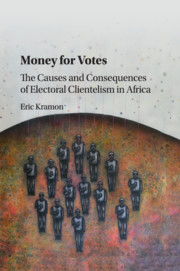3 - Theory: Electoral Clientelism as Information
from Part I - The Puzzle of Electoral Clientelism
Published online by Cambridge University Press: 26 October 2017
Summary
According to the constitution, it is illegal. The constitution interprets [it] as corruption, as if you were buying the vote. But [he] does not buy your vote because he is a kind of a person who is ready to listen to your problems. If the problem touches his heart, he's ready to get in his pocket and help you according to your need, but not to buy your vote.
Kenyan voter interviewed on National Public Radio's Planet MoneyThis chapter advances a theory to explain the prevalence and effectiveness of electoral clientelism. I test the implications of this theory, as well as some of the assumptions that underpin it, in the empirical chapters that make up the remainder of this book. My theoretical framework departs from the dominant approach in the political economy literature on electoral clientelism. While existing theoretical models differ in important ways, including in some of their empirical predictions and normative implications, they are unified in that they apply a transactional framework. Each suggests that electoral handouts are used to purchase desired political behaviors from voters. The objects of purchase—the vote, turnout, abstention—are the subjects of debate, as are the mechanisms of contract enforcement.
Yet, as the quote above illustrates, voters in some contexts do not conceptualize electoral handouts in a transactional way. Indeed, this Kenyan explicitly rejects the notion that the candidate from his constituency distributes money in an attempt to buy votes. This suggests that a transactional framework may be too narrow to understand fully the causes and consequences of electoral clientelism.
Building upon observations from fieldwork and ethnographic literature on elections in Africa, I advance an alternative framework that conceptualizes electoral handouts as gifts that contain social information. I argue that politicians distribute electoral handouts to convey information to voters who are uncertain about which candidates will best serve their interests. More specifically, electoral clientelism is effective because it conveys information that helps politicians to establish credibility with respect to the future provision of resources to the poor. For a number of reasons that I outline in detail below, credibility in this respect is important for political candidates in much of Africa.
- Type
- Chapter
- Information
- Money for VotesThe Causes and Consequences of Electoral Clientelism in Africa, pp. 47 - 66Publisher: Cambridge University PressPrint publication year: 2017



